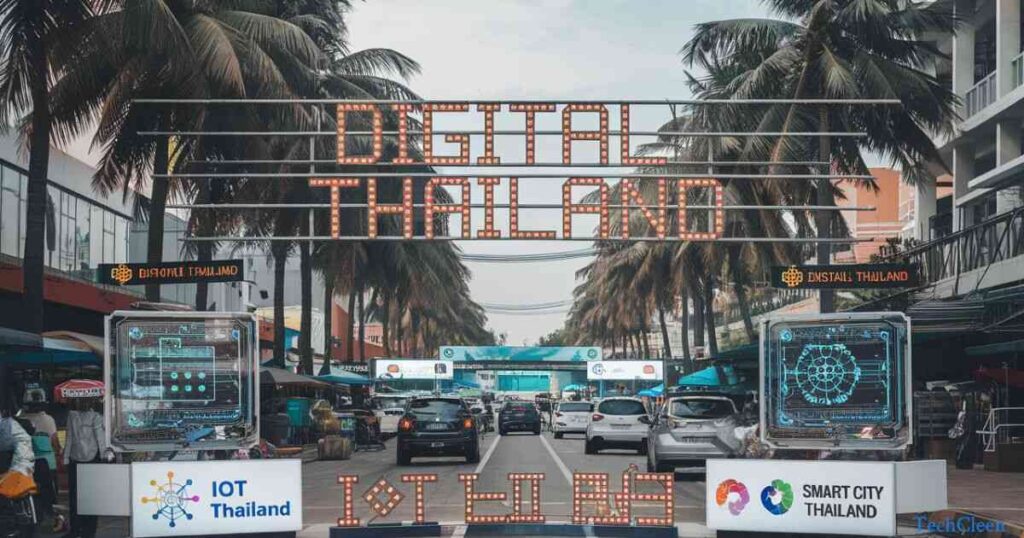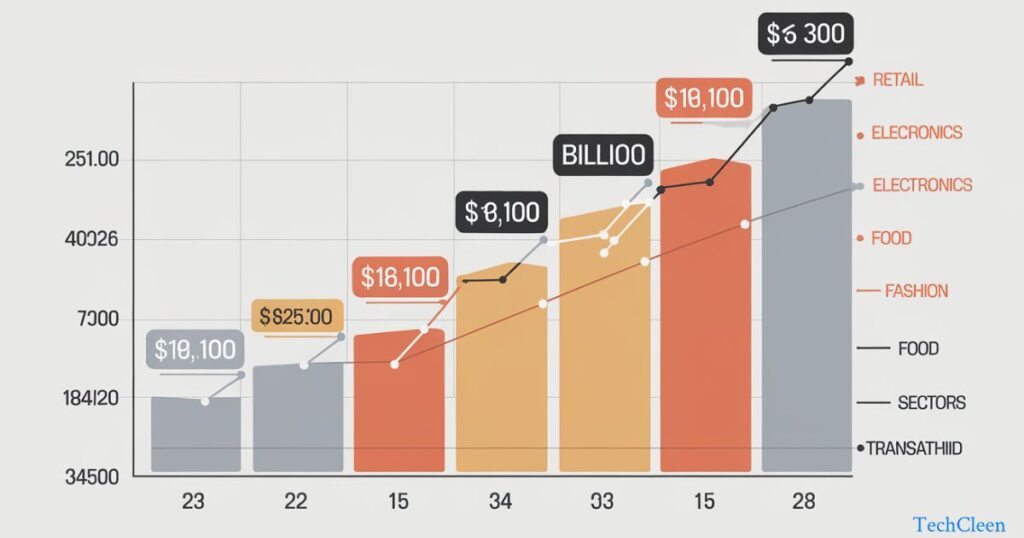Thailand’s digital landscape is undergoing a rapid transformation. Many businesses and individuals struggle to keep up with the pace of technological change. This digital gap threatens economic growth and competitiveness. However, the country is embracing new digital technologies across various sectors.
From e-commerce to smart cities, Thailand is leveraging innovation to drive progress. This blog post explores the latest digital advancements in Thailand, highlighting key areas of development.
We’ll examine how these technologies are reshaping industries, improving daily life, and positioning Thailand as a digital hub in Southeast Asia. Understanding these changes is crucial for anyone interested, of Digital Technology in Thailand.
The Digital Thailand Initiative

Thailand’s government launched the Digital Thailand Initiative in 2016. This plan aims to transform the country into a digital economy. It focuses on improving digital infrastructure and skills. The initiative supports —Digital Technology— adoption in various sectors. By 2025, Thailand aims to become a leading digital hub in Southeast Asia.
Impact of Digital Technology on Thai Society
—Digital Technology— is changing daily life in Thailand. More people use smartphones for online shopping and banking. Digital payments are becoming common in cities and rural areas. Social media connects Thais across the country. Online education is growing, especially since 2020. These changes are reshaping social interactions and work patterns.
Newest Digital Technologies in Thailand

Thailand is embracing cutting-edge —Digital Technology–. The top five include artificial intelligence, Internet of Things, blockchain, 5G networks, and augmented reality. These technologies are transforming industries and services. They offer new solutions for business, healthcare, and education. Thai companies are increasingly adopting these innovations to stay competitive.
Artificial Intelligence and Machine Learning
AI and machine learning are gaining ground in Thailand. Banks use AI for customer service and fraud detection. Hospitals employ AI for medical imaging analysis. Thai factories are adopting AI for quality control and production optimization. —Digital Technology— startups in Bangkok are developing AI solutions for various industries. The government is also investing in AI research and development.
Internet of Things (IoT) Adoption
IoT devices are becoming more common in Thai homes and businesses. Smart home systems control lighting and air conditioning. Factories use IoT sensors for equipment monitoring. Farmers employ IoT for crop management and irrigation. In Bangkok, IoT helps manage traffic and reduce pollution. —Digital Technology— companies are creating new IoT applications for Thai consumers.
Thailand’s E-Commerce Boom

E-commerce in Thailand is growing fast. In 2022, online sales reached $30 billion. More Thais are shopping online for clothes, electronics, and food. —Digital Technology— is making shopping easier and faster. Big cities like Bangkok lead this trend, but smaller towns are catching up. The COVID-19 pandemic boosted online shopping even more.
Key Players in Thai E-Commerce
Several companies dominate Thai e-commerce. Shopee and Lazada are the biggest platforms. Local players like JD Central and Central Online are also popular. These companies use —Digital Technology— to improve customer experience. They offer fast delivery and easy payments. In 2023, Shopee had about 40% market share, followed by Lazada with 30%.
Mobile Commerce Trends
Most Thai shoppers now use smartphones for online buying. Mobile apps are popular for shopping. In 2023, over 70% of online purchases were made on phones. —Digital Technology— makes mobile shopping fast and secure. People shop while commuting or relaxing at home. Apps offer personalized recommendations and easy checkout.
Social Commerce in Thailand
Selling through social media is big in Thailand. Facebook and Instagram are popular for small businesses. Line, a messaging app, is also used for selling. —Digital Technology— helps connect sellers and buyers directly. In 2022, about 30% of online sales happened through social media. Many Thais prefer buying from friends or local sellers on these platforms.
Digital Technologies Transforming Thailand’s Education
—Digital Technology— is changing education in Thailand. Schools use tablets and smart boards. Universities offer online courses. Students can access learning materials anytime. In 2021, the government launched a national e-learning platform. This helps students in remote areas get better education. Digital tools make learning more interactive and fun.
E-Learning Platforms and MOOCs
Online courses are growing in Thailand. Platforms like Coursera and edX offer many subjects. Thai universities also create their own online courses. —Digital Technology— makes learning flexible. Students can study at their own pace. In 2022, over 1 million Thais took online courses. These platforms help people learn new skills for work.
Digital Classrooms and Smart Schools
Many Thai schools are becoming digital. They use computers and internet in classrooms. Some schools have virtual reality for learning. —Digital Technology— makes lessons more engaging. Teachers can track student progress easily. In Bangkok, 70% of schools had smart classrooms by 2023. The government plans to expand this to all schools by 2025.
Personalized Learning through AI
AI is making education personal in Thailand. Some schools use AI to adapt lessons for each student. It helps identify what a student needs to improve. —Digital Technology— can suggest extra practice or new topics. This makes learning more effective. In 2023, a pilot program in 100 schools showed improved test scores using AI-assisted learning.
Digitalization’s Reach in Thai Communities
—Digital Technology— is changing life in Thai cities and villages. In Bangkok, people use apps for daily tasks. Rural areas get better internet access. Farmers use smartphones for weather updates and crop prices. In 2023, 85% of Thais used the internet. This technology helps communities stay connected and grow.
Bridging the Digital Divide
Thailand is working to bring internet to all areas. The government set up Wi-Fi spots in villages. Mobile companies expand 4G coverage. —Digital Technology— reaches more remote places. In 2022, a project connected 24,700 villages to high-speed internet. This helps rural people access online services and education.
Digital Skills Training Programs
Thailand offers many programs to teach digital skills. Libraries hold computer classes for seniors. Youth centers teach coding. Companies train workers in new technologies. —Digital Technology— skills are important for jobs. In 2023, over 500,000 Thais joined digital training courses. These programs help people of all ages use technology better.
Read This Blog : Enjoy4Fun: The Best Spot for Free Online Games
Community-based Digital Projects
Local groups in Thailand use technology for community projects. In Chiang Mai, an app helps sell handmade goods. A village in Isaan uses social media to promote tourism. —Digital Technology— supports local development. These projects started in 2020 and have helped over 100 communities. They show how technology can solve local problems.
Government Initiatives Driving Digital Technology in Thailand
The Thai government has many plans for —Digital Technology–. They want to make Thailand a digital hub. There are policies for better internet and smart cities. The Digital Economy Promotion Agency leads many projects. In 2023, the government spent $1 billion on digital initiatives. These efforts aim to boost the economy and improve services.
Thailand 4.0 and Its Digital Components
Thailand 4.0 is a plan for a high-tech economy. It focuses on innovation and —Digital Technology–. The plan supports new industries like robotics and biotechnology. It started in 2016 and aims to transform the economy by 2026. The government offers incentives for tech companies and startups.
Digital Government Agency Projects
The Thai government is making its services digital. People can now pay taxes online. Getting ID cards is easier with digital systems. —Digital Technology— makes government work faster. By 2023, 80% of government services were available online. This saves time for people and reduces paperwork.
Regulatory Framework for Digital Business
Thailand has new laws for digital business. These rules cover data privacy and online transactions. They help companies use —Digital Technology— safely. The Personal Data Protection Act started in 2022. It protects people’s information online. These laws make it easier for digital businesses to grow in Thailand.
Fostering Tech Talent for Thailand’s Digital Economy
Thailand is working hard to build a tech-savvy workforce. The country needs more IT experts and programmers. Schools and companies offer training in —Digital Technology–. The government launched a program in 2022 to train 100,000 tech workers by 2025. This helps Thailand compete in the global digital economy.
Also Read This Blog: Arfraier Q Faz de Tdo: Unlocking the Secrets to Doing It All
STEM Education Initiatives
Thailand is pushing for better science and tech education. Schools now focus more on hands-on learning. —Digital Technology— is part of many lessons. In 2023, the Education Ministry started a new STEM curriculum for all schools. This prepares students for future tech jobs. Many schools now have coding classes and robotics clubs.
Coding Bootcamps and Tech Academies
Short, intense coding courses are popular in Thailand. These bootcamps teach programming skills quickly. Tech academies offer longer courses in —Digital Technology–. In Bangkok, there were 20 coding bootcamps in 2023. These programs help people change careers or start tech companies. Many graduates find jobs in Thailand’s growing tech sector.
Industry-Academia Partnerships
Thai universities are working closely with tech companies. Students get internships at big firms. Companies help design courses in —Digital Technology–. In 2022, five major universities partnered with global tech giants. This gives students real-world experience. It also ensures that education matches industry needs.
Securing Thailand’s Digital Infrastructure
Thailand is working to protect its online systems. The government and businesses are improving cybersecurity. They use advanced —Digital Technology— to guard against hackers. In 2023, Thailand invested $200 million in cybersecurity measures. This helps keep digital services safe for everyone.
National Cybersecurity Strategy
Thailand has a plan to defend its digital world. The strategy focuses on protecting important computer systems. It also aims to build trust in —Digital Technology–. The National Cybersecurity Agency was set up in 2019. They work to keep Thailand safe from cyber threats.
Data Privacy and Protection Laws
Thailand introduced new data protection laws in 2022. The Personal Data Protection Act (PDPA) safeguards people’s personal information. Companies must be careful with customer data. –Digital Technology– users now have more rights over their data. The law covers both online and offline data. Businesses had to update their practices to follow these new rules.
Cybersecurity Awareness and Education
Thailand is teaching people about online safety. Schools now include digital security lessons. The government runs public campaigns about cyber risks. –Digital Technology– users learn how to protect themselves online. In 2023, over 1 million Thais attended cybersecurity workshops. This helps reduce online scams and data theft.
Healthcare Revolution through Digital Technology in Thailand
–Digital Technology– is changing healthcare in Thailand. Hospitals use digital records for better patient care. People can book doctor appointments online. Wearable devices track health data. In 2023, 70% of Thai hospitals had electronic health records. This makes healthcare faster and more efficient.
Telemedicine and Remote Healthcare
More Thais are seeing doctors online. Video calls replace some in-person visits. This helps people in rural areas get medical advice. –Digital Technology– makes healthcare more accessible. In 2022, Thailand had over 5 million telemedicine consultations. This trend grew faster after the COVID-19 pandemic.
Health Tech Startups and Innovation
New companies in Thailand are creating health tech solutions. They make apps for fitness and mental health. Some develop AI for disease detection. –Digital Technology– is making healthcare smarter. By 2023, Thailand had over 100 health tech startups. These innovations are improving healthcare for many Thais.
AI and Big Data in Thai Healthcare
Hospitals in Thailand use AI to analyze medical data. It helps doctors make faster, more accurate diagnoses. Big data improves treatment plans. –Digital Technology– is making healthcare more precise. In 2023, five major hospitals in Bangkok started using AI for cancer detection. This technology saves lives by finding diseases early.
The Rise of Smart Cities in Thailand
Thailand is building cities with advanced technology. These smart cities use –Digital Technology– to improve life. They have better traffic management and energy use. Sensors monitor air quality and water systems. By 2023, Thailand had plans for 100 smart cities across the country. This makes urban living more efficient and comfortable.
Phuket Smart City Project
Phuket is becoming a high-tech island. It uses –Digital Technology– to enhance tourism and city life. The project started in 2018. Smart traffic lights reduce congestion. An app helps tourists find attractions. Free Wi-Fi covers many public areas. This makes Phuket more attractive to visitors and improves life for locals.
Bangkok’s Smart City Initiatives
Bangkok is using technology to solve urban problems. The city has a smart traffic system to reduce jams. –Digital Technology– helps manage floods and pollution. In 2022, Bangkok launched a city data platform. This helps officials make better decisions. The goal is to make Bangkok more livable and efficient.
Sustainable Technology in Urban Planning
Thai cities are using –Digital Technology– to become greener. Smart grids save energy in buildings. Apps encourage recycling and reduce waste. Sensors monitor and control pollution. In 2023, Chiang Mai started using AI to manage its air quality. These technologies help make Thai cities cleaner and more sustainable.
Fintech Innovation: Changing the Way People Bank in Thailand
—Digital Technology— is reshaping banking in Thailand. More people use smartphones for financial tasks. Banks offer online services and mobile apps. In 2023, 70% of Thais used digital banking. New fintech companies create innovative financial products. This makes managing money easier and faster for Thai people.
Mobile Banking and Digital Payments
Thais increasingly use phones for banking. Mobile apps let people send money and pay bills. Digital wallets are popular for shopping. —Digital Technology— is making cash less necessary. By 2022, over 80% of Thais used mobile banking apps. This trend is creating a more cashless society in Thailand.
Robo-Advisors and AI in Finance
New tools use AI to help Thais manage money. Robo-advisors suggest investments based on personal goals. Banks use AI to detect fraud and assess loans. —Digital Technology— makes financial advice more accessible. In 2023, five major Thai banks launched robo-advisor services. This helps more people invest wisely.
Peer-to-Peer Lending Platforms
Online platforms now connect borrowers with lenders directly. This offers new options for loans. Small businesses find it easier to get funding. —Digital Technology— is changing how Thais borrow money. In 2022, P2P lending in Thailand reached $300 million. This provides more financial opportunities for many people.
The Role of Logistics and Payment Solutions in Thailand’s Digital Economy
—Digital Technology— is improving how goods are delivered and paid for. E-commerce companies use smart systems to manage deliveries. Digital payments make online shopping easier. In 2023, 90% of online purchases in Thailand used digital payments. This makes buying and selling more efficient.
Last-Mile Delivery Innovation
New tech solutions help deliver products faster in Thailand. Companies use apps to track packages in real-time. Some are testing drones for delivery. —Digital Technology— is making shipping more efficient. In Bangkok, same-day deliveries increased by 50% in 2023. This improves the online shopping experience for customers.
Integrated Payment Systems
Thailand is developing seamless ways to pay across different platforms. QR code payments are common in shops and online. E-wallets work with many services. —Digital Technology— connects various payment methods. In 2022, Thailand processed over 10 billion digital transactions. This makes payments faster and more convenient.
Blockchain in Supply Chain Management
Thai companies are starting to use blockchain for logistics. It helps track products from factory to customer. This technology improves transparency and reduces fraud. —Digital Technology— is making supply chains more efficient. In 2023, Thailand’s largest retailer began using blockchain for food traceability. This ensures product quality and safety.
Frequently Asked Question
What are the new digital technologies in Thailand?
Thailand is adopting AI, IoT, blockchain, 5G networks, and AR/VR technologies. These are transforming various sectors including finance, healthcare, and urban planning.
How has 5G impacted Thailand’s digital landscape?
5G has accelerated internet speeds and enabled new applications in Thailand. It supports smart city initiatives, IoT devices, and enhances mobile experiences for users.
What are the main challenges in Thailand’s digital transformation?
Key challenges include bridging the digital divide, ensuring cybersecurity, and developing a skilled workforce. Adapting regulations to keep pace with technological changes is also crucial.
What are some examples of smart cities in Thailand?
Phuket and Bangkok are leading smart city projects in Thailand. They use digital technologies for better traffic management, energy efficiency, and improved public services.
Conclusion:
Thailand is rapidly embracing —Digital Technology— across various sectors, from finance to healthcare and urban development. The government’s initiatives, coupled with private sector innovation, are driving this digital transformation.
As Thailand moves towards a more connected and tech-savvy future, it faces challenges in ensuring inclusive growth and addressing the digital divide. However, the country’s commitment to fostering tech talent and improving digital infrastructure positions it well for continued progress.
This digital revolution is not just changing how businesses operate, but also how Thai people live, work, and interact in their daily lives.

With a robust five-year background in the ever-evolving realm of tech gadgets, I bring a wealth of hands-on experience and a deep understanding of the latest technological advancements.











